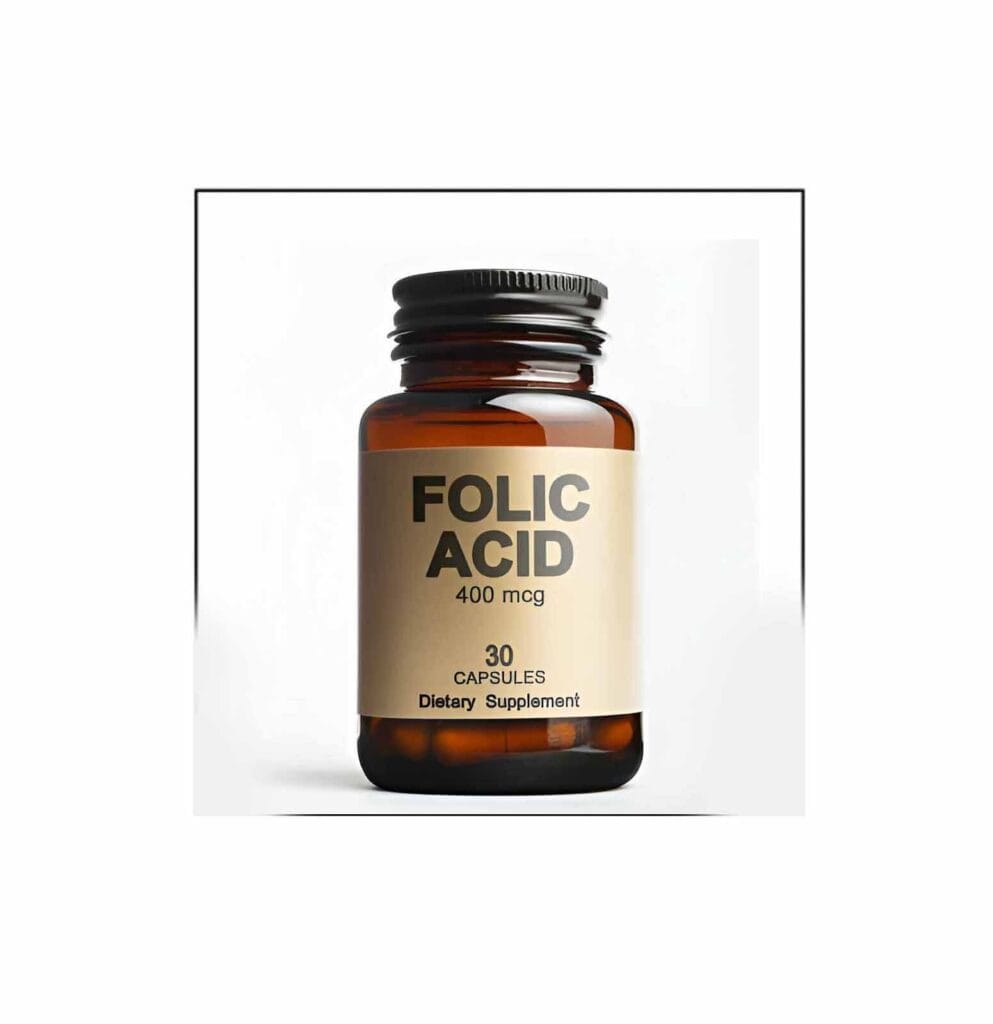Table of Contents
ToggleIntroduction
Folic acid, also known as Vitamin B9 or Folate, is the synthetic form of one of the thirteen important vitamins necessary for the well-being and development of the human body. There are many fruits and vegetables rich in Vitamin B9, and they can be excellent sources when consumed regularly. This article highlights evidence-based reasons why it is important for your health.
Overview of the article:
- Folic Acid Benefits
- Symptoms of Deficiency and Toxicity
- Foods rich in Folate
- Recommended Intake of Folic Acid
Folic Acid Benefits
Benefits of Folic Acid for Pregnancy

This is vital in proper development of the fetus’s nervous system. Sufficient consumption of folic acid by the mother can prevent the growth of neural tube defects. Neural tube defects are birth defects that cause malformation of the fetus’s brain, spine, or spinal cord. Countless studies have been done on the use of Folic acid and neural tube defect prevention. These pregnancy complications can be avoided with regular consultation with a physician.
Folic Acid for Men
Folic acid benefits for men’s health are highlighted in some studies. Folic acid supplements for male fertility are often sold in combination with zinc. Some studies show that men with prolonged use of a combination of folate, Vitamin E, Selenium, and Zinc, had higher sperm count concentration and motility than those who did not use the supplements.
Folic Acid and Cell Regeneration
Vitamin B9 plays a vital role in cell regeneration and maturation. Due to Vitamin B9’s involvement in the metabolism of various carbohydrates, proteins, and fats, it serves as a cofactor for some enzymes in the body.
Being a water-soluble nutrient, folate passes readily into the cells. It has a crucial role in the synthesis, repair, and regeneration of DNA and RNA, the genetic code within all the cells in the body.
Inflammation is a major culprit for cellular damage and aging. Vitamin B9 plays a major role in decreasing inflammatory markers and at the same time catalyzing cellular proliferation and tissue repair. Low folic acid levels in the blood can increase acute and chronic inflammation in the body.
Folic Acid and Skin

Skin is the largest organ of the body and a perfect reflection of the body’s health. Folic acid benefits for skin health are remarkable. Folic Acid reduces DNA damage and hence prevents the early onset of premature skin aging such as fine lines and wrinkling. Folic acid being a water-soluble nutrient, replenishes the skin’s hydration by repairing and maintaining the skin’s moisture barrier and decreasing dryness.
Folic Acid for Hair Growth

Folate deficiency can often lead to dull hair, and consequently, scalp hair thinning and hair fall. Dermatologists acknowledge folic acid benefits for hair growth. Alongside DNA synthesis, folic acid plays a vital role in the production and deposition of keratin, the protein building block of hair structure. It also ensures nourishment of the hair follicle and strengthening.
Folic Acid and Brain Health

Due to the inflammation-curbing, and regenerative properties of folic acid, it is found to be important for nervous system functioning. Several neurotransmitters i.e. the chemicals in the nervous system responsible for effective communication between different nerves, are synthesized due to the availability of folate. Folic acid shows effectiveness in enhancing memory.2
Mood Regulation with Folic Acid
Alongside regulation of the nervous system, Vitamin B9 contributes effectively to the regulation of mood. As it stimulates various neurotransmitters, these chemicals maintain emotional well-being. Including folate folate-rich diet can help decrease irritability, depression, and mental fatigue.
Folate breaks down in the body and gives away energy. This boost of energy can also be associated with how folic acid improves mood in subjects with depression.
Folic Acid for Anemia Treatment
Folate-deficiency anemia is a form of anemia where insufficient serum folate levels decrease the production of red blood cells in the bone marrow and other blood cell production centers of the body. It is vital to include folic acid for anemia treatment. At times, the red blood cells produced are of irregular shape or have not matured. This can lead to anemia and associated symptoms.
Folic Acid and Heart Disease Prevention

People with high blood pressure often benefit from the use of increased folic acid in their everyday diet. It is said the risk of cardiovascular disease and the occurrence of stroke decreases by up to 20% with consumption of the daily recommended intake of folic acid.3
Homocysteine is a type of amino acid, high levels of it in the blood can lead to damage of vessels. It promotes blood clot formation and cardiac arrest. Folic acid therapy is known to decrease the levels of homocysteine. Preventing the onset and progression of cardiovascular accidents and diseases.
Symptoms of Deficiency and Toxicity
Common symptoms of folic acid deficiency are:
- Pallor
- Dizziness
- Moodiness
- Memory issues
- Red tongue
- Mouth sores
- Attention deficit
- Lethargy
- Weakness
- Diarrhea
- Weight loss
Some symptoms of possible folic acid toxicity are
- Upset stomach
- Behavioral changes
- Confusion
- Shortness of breath
- Acute skin conditions
- Seizures
Foods rich in Folate
Enlisted are some food sources from most to least rich in folate:
- Beef liver
- Spinach
- Black-eyes peas
- Fortified cereals
- Asparagus
- Brussel sprouts
- Lettuce
- Avocado
- Kidney beans
- Peanuts
- Beans
Recommended Intake of Folic Acid
As per a Harvard study, the Recommended Dietary Allowance (RDA) of folic acid should be kept in the stated range to avoid symptoms related to folic acid deficiency and toxicity:4
- For men and women (19+ years): 400 mcg daily
- For regular alcohol drinkers: minimum 600 mcg daily
- For pregnant and lactating women: 500-600 mcg daily
It is recommended to consult a physician before opting supplement of any nutrient for a prolonged period.
References
https://pubmed.ncbi.nlm.nih.gov/11872201






One Response
Your article helped me a lot, is there any more related content? Thanks!